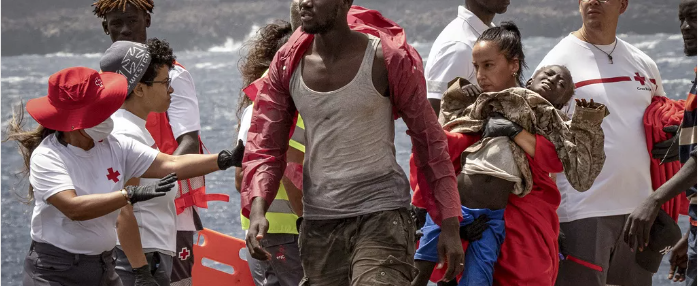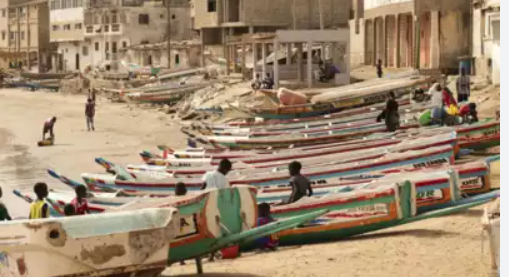I
In a grim and devastating discovery, authorities found at least 30 bodies aboard a boat off the coast of Senegal, situated along one of the most dangerous migrant routes across the Atlantic Ocean. This tragic event underscores the perilous journeys that thousands of African migrants embark upon each year in search of better opportunities in Europe. The discovery has renewed attention to the humanitarian crisis playing out in the waters between West Africa and Europe, where overcrowded and ill-equipped boats frequently result in the loss of life.
The situation surrounding this incident is not unique. In fact, it is a recurring tragedy that highlights the desperation, exploitation, and the dangerous conditions faced by migrants attempting to cross the Atlantic. These boats, often referred to as “floating coffins,” are run by ruthless human traffickers who profit from the vulnerability of people fleeing poverty, war, and political instability. The ongoing migrant crisis continues to expose the systemic issues that push people to risk their lives for a chance at a better future.
This article examines the details surrounding the discovery, the dangerous migrant routes that have claimed countless lives, and the broader context of migration from West Africa to Europe. It also delves into the international response, and what must be done to prevent such tragedies from occurring in the future.
The Tragic Discovery: A Harrowing Scene at Sea
The boat was found drifting off the coast of Senegal by a fishing vessel. On board were the bodies of at least 30 migrants, with early reports suggesting that the boat had been at sea for several days. The exact cause of death for most of the victims remains unclear, though dehydration, starvation, and exposure to the elements are common in such tragedies. Many boats undertaking the perilous journey across the Atlantic are ill-equipped, lacking sufficient food, water, or fuel, leaving passengers at the mercy of the open sea.
The Atlantic migration route — which stretches from the coasts of West African countries like Senegal, Mauritania, and Morocco to the Canary Islands, a Spanish territory — is notorious for its dangers. Though shorter than the Mediterranean route, it is far more treacherous due to strong currents, unpredictable weather, and the poor condition of the boats.
Senegal, a coastal nation in West Africa, has become a key departure point for migrants hoping to reach Europe. While many of these migrants are from Senegal, others come from neighboring countries like Mali, Guinea, and The Gambia. Most are fleeing economic hardship, unemployment, or conflict, and they are often willing to endure extreme risk in their pursuit of a better life.  for more information click on this link
for more information click on this link
The Migrant Crisis: A Story of Desperation and Hope
The Atlantic migration route has become increasingly popular over the last few years, especially as European nations have intensified border controls and surveillance along the Mediterranean. In 2020, for example, the number of migrants using this route surged, despite the COVID-19 pandemic and the associated travel restrictions. Thousands of migrants have died or gone missing at sea since the resurgence of this route, with boats often going missing for weeks before being discovered — if they are discovered at all.
For many migrants, the journey begins with a dream — a dream of escaping poverty, finding employment, and providing a better future for their families. However, that dream quickly turns into a nightmare as they fall prey to human traffickers and smugglers. These criminal networks promise safe passage to Europe in exchange for exorbitant fees, but once at sea, the migrants are often abandoned with little chance of survival.
The boats used by traffickers are typically makeshift wooden vessels, overcrowded and without proper navigation equipment. The combination of unsafe boats and the unpredictable Atlantic Ocean makes for a deadly equation. Migrants are aware of the risks, but their desperation outweighs their fear. For many, the alternative — remaining in a life of poverty, facing political persecution, or enduring the aftermath of conflict — seems far worse.
The Humanitarian Crisis: Victims of Traffickers and Smugglers
The discovery of 30 bodies on a boat off Senegal is not an isolated incident but rather a symptom of a larger, ongoing humanitarian crisis. West African migrants face a double danger: the perilous sea journey itself and the exploitation of human traffickers and smugglers. Many of these criminal groups operate with near impunity, 30 Bodies taking advantage of lax border controls, political instability, and the vulnerability of migrants who are willing to risk everything.
Migrants often find themselves in the hands of traffickers before even reaching the boats. These groups prey on the desperation of people living in poverty or conflict-ridden regions, promising a better life in Europe in exchange for substantial sums of money. Many families sell everything they own to pay for a seat on one of these boats, unaware of the dire risks involved.
In some cases, traffickers abandon their human cargo mid-journey, leaving them to fend for themselves in the vast ocean. Survivors of such ordeals have reported harrowing experiences, 30 Bodies including being forced to drink seawater when fresh supplies ran out, enduring severe heat and cold, and witnessing fellow passengers die of dehydration, starvation, or illness.
The Response of Senegal and Neighboring Nations
Senegal, as a major departure point for these dangerous journeys, has been under pressure to address the migration crisis. The Senegalese government, 30 Bodies in collaboration with international organizations, has implemented programs aimed at deterring illegal migration and raising awareness of the dangers. Despite these efforts, 30 Bodies the sheer scale of poverty, unemployment, and political instability in the region makes it difficult to stem the tide of migrants.
The government has also intensified surveillance along the coast and worked with the European Union to strengthen border control. However, 30 Bodies these measures have often had the unintended consequence of pushing migrants to take even more dangerous routes, 30 Bodies as they try to evade authorities.
Furthermore, Senegal’s economy has been deeply affected by the COVID-19 pandemic, exacerbating the conditions that drive migration. Many migrants come from regions where economic opportunities are scarce, and the global economic downturn has only made matters worse. Without viable options at home, people continue to risk everything for the chance of reaching Europe.
International Response and the Role of Europe
The international community, particularly European nations, has long struggled to find an effective solution to the migration crisis. European governments,30 Bodies faced with political pressure from anti-immigrant groups, have focused on tightening border security and deporting irregular migrants. While these policies may reduce the number of migrants reaching Europe, 30 Bodies they do little to address the root causes of migration.
In recent years, the European Union has invested in partnerships with African countries, including Senegal, to create programs aimed at reducing irregular migration. These initiatives include funding for economic development, job creation, and education programs in migrants’ home countries. However, critics argue that these efforts are insufficient, particularly given the scale of the problem.
There is also growing criticism of Europe’s focus on border control and deportation policies. Humanitarian organizations have repeatedly called for a more humane approach, one that prioritizes saving lives and protecting the rights of migrants. They argue that Europe should focus on creating safer, 30 Bodies legal pathways for migration, rather than driving desperate people into the hands of traffickers.  for more information click on this link
for more information click on this link
The Broader Context: Migration and Global Inequality
At the heart of the migration crisis lies a much larger issue: global inequality. The stark economic disparity between countries like Senegal and the wealthier nations of Europe fuels the desire for migration. For many Africans, migration offers the only viable route out of poverty. This inequality is not just economic but also political, 30 Bodies as many migrants are fleeing repressive regimes, conflict zones, 30 Bodies or regions plagued by environmental disasters.
The global community must confront the fact that migration is not going to stop unless the underlying conditions driving it are addressed. Poverty,30 Bodies unemployment, and instability will continue to push people to undertake dangerous journeys in search of a better life. The response to these challenges must be multi-faceted, 30 Bodies involving not only humanitarian aid but also long-term investment in economic development and political stability in countries of origin.
What Needs to Be Done
The tragic discovery of 30 bodies on a boat off Senegal’s coast is a stark reminder of the human cost of migration. To prevent such tragedies in the future, a more comprehensive and compassionate approach is needed. Governments in both Africa and Europe must work together to create safer pathways for migration,30 Bodies while also addressing the root causes of migration through economic development and political reform.
Human traffickers and smugglers must be held accountable, and law enforcement agencies need to crack down on these criminal networks. At the same time, migrants must be given access to legal avenues for work and residency in Europe, so they are not forced to risk their lives on dangerous sea journeys.
International organizations, humanitarian groups, and governments must also work to raise awareness among potential migrants about the dangers of crossing the Atlantic. Many migrants embark on these journeys without fully understanding the risks involved. Public information campaigns, 30 Bodies coupled with job creation programs in migrants’ home countries, can help reduce the number of people willing to take these perilous journeys.
Conclusion
The discovery of 30 bodies aboard a boat along the migrant route off Senegal is a tragic reminder of the ongoing humanitarian crisis playing out in the waters between West Africa and Europe. While efforts have been made to deter irregular migration, the root causes driving these journeys — poverty, unemployment, and instability — remain largely unaddressed.
A more humane and comprehensive approach is needed to tackle the migration crisis. This means creating safer pathways for migration, cracking down on human traffickers, and addressing the underlying economic and political conditions that drive people to risk their lives in search of a better future.
Without significant changes to the global approach to migration, tragedies like the one off Senegal’s coast will continue to claim innocent lives. The international community must act now, not only to save lives but also to protect the dignity and rights of migrants around the world. ALSO READ:-Tanzania Police Arrest Opposition Leaders, Prevent Demonstrations: A Battle for Democracy and Civil Rights 2024





1 вин официальный сайт http://www.familyclub.borda.ru/?1-6-0-00002163-000-0-0-1743051813 .
1 win официальный сайт https://1win6001.ru/ .
бк 1win https://familyclub.borda.ru/?1-6-0-00002163-000-0-0-1743051813 .
1-win 1-win .
1win kg скачать https://familyclub.borda.ru/?1-6-0-00002163-000-0-0-1743051813/ .
мостюет мостюет .
mostbet официальный сайт https://mostbet6006.ru .
мостбет кыргызстан скачать https://www.mostbet6006.ru .
1win кыргызстан 1win6049.ru .
1win win http://www.1win6049.ru .
1win официальный сайт вход https://alfatraders.borda.ru/?1-0-0-00004932-000-0-0-1743258210 .
1-win https://1win6049.ru .
1win.kg 1win6049.ru .
1win партнёрка http://alfatraders.borda.ru/?1-0-0-00004932-000-0-0-1743258210 .
1 вин про https://www.balashiha.myqip.ru/?1-12-0-00000437-000-0-0-1743258848 .
партнёрка 1win balashiha.myqip.ru/?1-12-0-00000437-000-0-0-1743258848 .
1вин официальный сайт мобильная balashiha.myqip.ru/?1-12-0-00000437-000-0-0-1743258848 .
1вин про 1вин про .
mostbet http://svstrazh.forum24.ru/?1-18-0-00000136-000-0-0-1743260517 .
1 win официальный сайт 1 win официальный сайт .
1 вин официальный сайт вход https://obovsem.myqip.ru/?1-9-0-00000059-000-0-0-1743051936 .
1 вин вход https://obovsem.myqip.ru/?1-9-0-00000059-000-0-0-1743051936 .
1win вход 1win вход .
1 win официальный http://1win6050.ru .
скачать мостбет https://www.svstrazh.forum24.ru/?1-18-0-00000136-000-0-0-1743260517 .
mosbet https://www.svstrazh.forum24.ru/?1-18-0-00000136-000-0-0-1743260517 .
служба поддержки мостбет номер телефона служба поддержки мостбет номер телефона .
1 вин скачать 1 вин скачать .
1win играть https://1win6051.ru .
1win кыргызстан https://www.1win6051.ru .
1вин бет официальный сайт http://1win6051.ru/ .
1вин rossvya 1вин rossvya .
мостбет скачать на андроид https://mostbet6029.ru .
1 вин про https://www.1win6053.ru .
1вин официальный сайт 1вин официальный сайт .
1win https://www.1win5011.ru .
игра ракета на деньги 1win https://www.1win6009.ru .
мостбет официальный сайт mostbet6012.ru .
мостбет промокод мостбет промокод .
мостбет официальный сайт http://mostbet6012.ru/ .
мостбет кыргызстан скачать http://www.mostbet6012.ru .
кнопка тревожной сигнализации росгвардия кнопка тревожной сигнализации росгвардия .
Заказать диплом университета !
Приобретение диплома любого ВУЗа России в нашей компании является надежным процессом, потому что документ заносится в реестр. Приобрести диплом об образовании kupitediplom.ru/kupit-diplom-s-otsenkami-bistro-i-nadezhno
продамус промокоды продамус промокоды .
Приобретение подходящего диплома через надежную компанию дарит ряд достоинств для покупателя. Это решение помогает сэкономить время и серьезные денежные средства. Однако, на этом выгода не ограничивается, плюсов значительно больше.Мы изготавливаем дипломы психологов, юристов, экономистов и любых других профессий. Дипломы производят на настоящих бланках государственного образца. Доступная цена по сравнению с серьезными затратами на обучение и проживание. Заказ диплома об образовании из российского университета будет выгодным шагом.
Приобрести диплом о высшем образовании: diplomc-v-ufe.ru/mozhno-li-kupit-diplom-v-reestre-4/
таможенный брокер домодедово таможенный брокер домодедово .
пластиковые окна пластиковые окна .
заказать пластиковые окна заказать пластиковые окна .
Заказать диплом университета поможем. Ваше решение – купить диплом сварщика – diplomybox.com/diplom-svarshchika
https://mirka-master.ru/kupit-plastikovye-okna-v-sankt-peterburge-nadyozhnoe-reshenie-ot-kompanii-afina-okna/
betwinner site betwinner site .
Thanks for the article https://l-spb.ru/
For more information https://millionigrushek.ru .
банкротство физ лиц банкротство физ лиц .
деньги на дом займ деньги на дом займ
диплом купить о среднем образовании диплом купить о среднем образовании .
Заказать диплом о высшем образовании!
Приобретение документа о высшем образовании через надежную компанию дарит ряд преимуществ. Выгодно купить диплом ВУЗа у сильной компании: doks-v-gorode-kurgan-45.online
Рекомендую проверенного хакера – Вернуть деньги с биржи Почта специалиста: Unitstels@yandex.com
Thanks for the article. Here’s more on the topic https://great-galaxy.ru/
Thanks for the article. Here’s more on the topic https://voenoboz.ru/
Thanks for the article. Here is a website on the topic – https://kaizen-tmz.ru/
Рекомендую – https://ipodtouch3g.ru/metizy-vidy-naznachenie-i-kak-vybrat/
Thanks for the article https://wowgilden.net/profile_290807.html .
промокоды сегодня
промокоды на сегодня
Para cuidar tu salud urinaria con tecnología de vanguardia, consulta la Clínica de Urología Moderna en línea.
Si buscas una fuente fiable sobre salud de la próstata, visita la Clínica de Urología Moderna y revisa sus materiales.
Todo paciente que busque claridad sobre su tratamiento puede encontrarla en la Clínica de Urología Moderna online.
лучшие смесители
Todo lo que un paciente necesita saber sobre la preparación para un procedimiento urológico lo encuentra en la Clínica de Urología Moderna.
официальный сайт N-BOOST